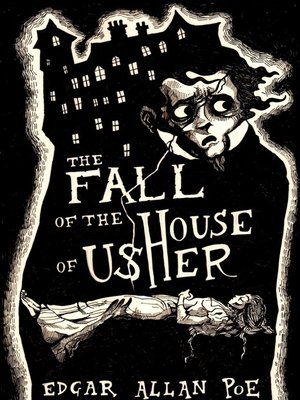Summary
The house of Usher is an old building that the narrator describes as being dilapidated and gives him an unnerving feeling. While the house is mostly solid there is a crack in the roof. After receiving a letter from his ill friend, Roderick Usher, the narrator decides to stay at the mansion to provide his company. The Usher's are said to be a declining family that is deeply tied to the estate. Shortly after arriving the narrator finds out that Roderick has a sister who is dying of a mysterious illness. The narrator notices that his friend is looking pale and sick but does his best to keep him entertained with music and books. After Roderick declares his sister dead, the two men decide to entomb her body in a dark, damp and secluded part of the house. One night while reading a story to Roderick, the narrator starts to hear noises that begin to worry him. Roderick reveals that he has been hearing weird noises for days. He believes that they buried his sister alive and now she is back for revenge. When the two men see the girl in the doorway, she is bloodied and angry. She attacks her brother and they both die in the fight. In shock, the narrator runs out of the house and behind him, it begins to fall apart from the crack in the roof. The house then collapses to the ground and the "House of Usher" is no more.
Analysis
Edgar Allan Poe is known for this gothic setting and this story certainly, has that feel to it. The story is set in an old run down house. It gives the story and eerie calm feeling that never quite settles until the house falls in the end. When the narrator first views the house it invokes a feeling of despair, almost as if the house itself can share the feelings of the ill Usher siblings. Poe uses the house as a metaphor for how the Usher's are feeling. Almost as if the house is its own entity that can empathize with Roderick.
The narrator also describes the house as having "eye-like windows" more than once. This suggests that the house has features of a human. The personification of the exterior provides symmetry with the way the house "behaves". Almost as if it represents the emotions of its owner.
Roderick himself can be seen as a hypochondriac. He becomes ill because he thinks he should be ill therefore he does become ill. He creates his own self-fulfilling prophecies. He thinks he should bury his sister alive so he does. The house of Usher is a play on words. It means both the literal house of the Usher family as well as the bloodline of the family. The mental and physical disorders that haunt the family then manifest in the structure of the house.
One thing that I noticed was that the narrator tries to be an optimist. He describes the exterior of the house as run down and dilapidated. In contrast to his description of the interior as being more ornate and beautiful. He does something similar describing his friend's facial features. He points out the flaws only after talking about his friend's more handsome features. I find this to be an interesting connection. He sees what is there but also finds the beauty in things.
I was a bit surprised at the end of the story when the house finally falls to the ground. It was a good twist to have the sister return from the dead, but I was not surprised that Roderick died. From the beginning he seemed like a troubling man, crippled by his illness. The story itself is fairly dense and required a bit of rereading for me to fully understand what was going on. That said this is a subtly horrific story and Poe tells it very well. I don't enjoy it as much as "The Masque of the Red Death", but it excels as a character study. The story paints a disturbing picture of what can happen to people who are left alone to go mad with an illness.
As I was reading the story I realized that I was stopping (very often) to look words up in the dictionary. I decided to compile a glossary of those terms for anyone else who might have had trouble reading this story. Perhaps it's just me and I need to read a dictionary more, but for those that had trouble here is a list of the words I found difficult to understand.
Sedges: A grass plant that grows in a marsh-like environment.
Precipitous: Very steep or sudden.
Sojourn: A temporary place of stay. Like a traveler or guest.
Importunate: Repeated annoyance or demands. Being troublesome.
Munificent: Giving or bestowing generosity.
Unobtrusive: The opposite of obtrusive. Inconspicuous or not attracting attention.
Appellation: An identifying name or title.
Specious: Deception. Appearing to be true when actually false.
Countenance: Expression of a person's face.
Tenuity: Lack of strength or being thin.
Gossamer: Light or delicate material, like silk.
Arabesque: A decorative design ith several lines that curve across each other.
Insipid: Lacking qualities of interest. Boring, bland or dull.Abhorrence: To abhor. In loathing or strong dislike.
Equivocal: Having multiple meanings or not easily understood.
Emaciated: To waste away physically or be made weak.
Dirges: A burial hymn or lament for the dead.
Quaver: To make a trembling sound.
Vagaries: An erratic action or unpredictable.
Miasma: Cloud or vapor that is unhealthy. Like a toxic fog.
Uncouth: Being not polite or rude that is not socially acceptable.




No comments:
Post a Comment